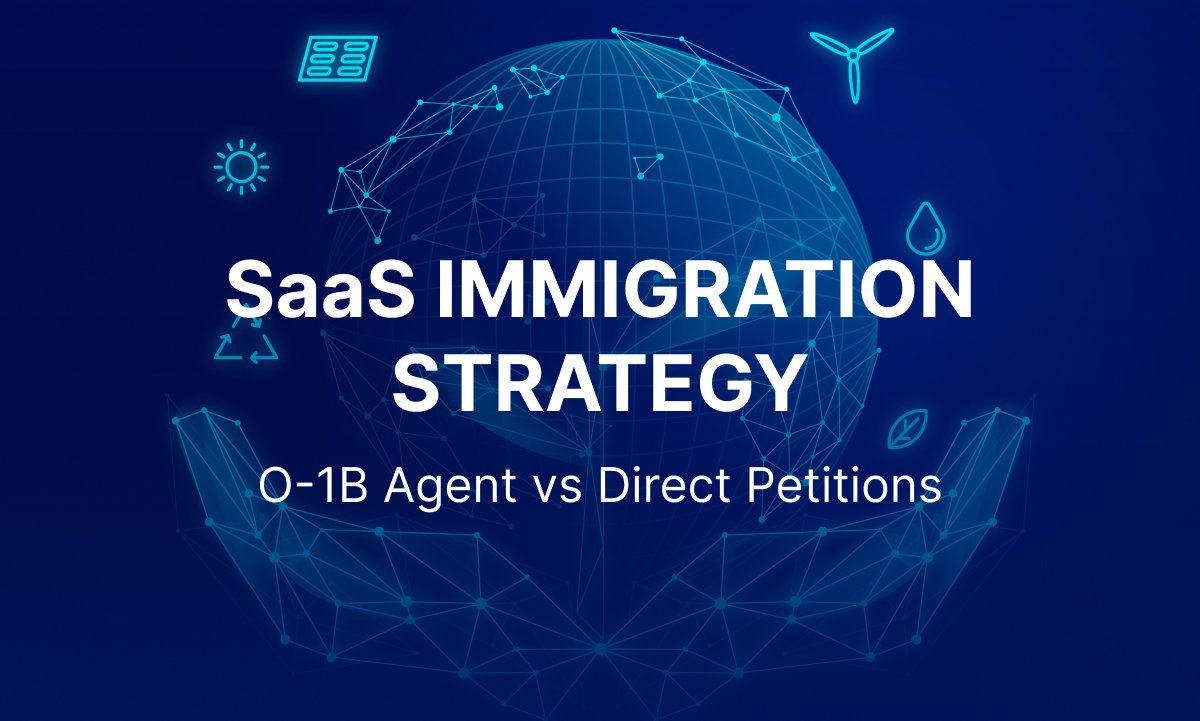Protecting Your SaaS Business While Supporting International Talent
As SaaS companies increasingly tap global talent pools, many find themselves navigating U.S. immigration sponsorship. The O-1B visa, designed for individuals with extraordinary ability in business, has become a popular option for bringing international consultants, advisors, and specialized talent to work with U.S. companies.
However, a critical decision awaits: should your company directly petition for the visa, or use an agent-based structure? For SaaS businesses, the answer is clear—agent petitions provide superior protection and flexibility.
Understanding the Petitioner Liability Problem
When Your SaaS Company Becomes an Immigration Employer
Direct O-1B sponsorship transforms your relationship with international talent:
- Legal Service Exposure: Your company must accept service of process for all immigration matters
- Compliance Obligations: Direct responsibility for maintaining visa validity
- Documentation Burden: Financial records and corporate structure under scrutiny
- Operational Constraints: Fixed employment terms that don’t match SaaS flexibility
For lean SaaS operations, these obligations can be disproportionately burdensome.
The Corporate Governance Trap
USCIS examinations of petitioning companies often reveal issues:
- Informal operating structures common in startups face scrutiny
- Board composition and decision-making processes get questioned
- Financial documentation requirements exceed normal business needs
- Corporate formalities become immigration necessities
Why SaaS Companies Need Agent-Based Solutions
1. Preserve Operational Agility
SaaS businesses thrive on flexibility. Agent petitions maintain this by:
- Allowing fluid consultant relationships
- Enabling project-based engagements
- Facilitating easy relationship transitions
- Supporting multiple simultaneous arrangements
2. Minimize Legal Exposure
Keep immigration liabilities separate from your core business:
- No service of process obligations
- No direct compliance responsibilities
- Clean separation of business and immigration matters
- Protection from visa-related legal issues
3. Simplify International Collaborations
Work with global talent naturally:
- No employer-employee obligations
- Standard contractor agreements remain valid
- Easy addition of new team members
- Seamless integration with distributed teams
4. Focus on Core Business
Let specialists handle immigration complexity:
- Professional agents manage USCIS requirements
- No internal immigration expertise needed
- Reduced administrative burden
- More time for product and growth
Real-World Scenarios
Scenario 1: The Technical Advisor
A SaaS startup needs a specialized international advisor for 6-12 months:
- Direct Petition: Creates employment relationship, locks in terms, requires corporate documentation
- Agent Petition: Simple consulting agreement, flexible arrangement, no corporate exposure
Scenario 2: The Implementation Consultant
An international expert helps enterprise clients implement your software:
- Direct Petition: Fixed role description, amendment needed for scope changes
- Agent Petition: Dynamic project assignments, easy client additions, natural evolution
Scenario 3: The Strategic Partnership
Collaborating with an international influencer or business developer:
- Direct Petition: Employer-employee dynamics complicate partnership
- Agent Petition: True partnership preserved, multiple revenue models supported
The Cost-Benefit Analysis
While agent petitions may cost $2,000-3,000 more initially, consider the savings:
- Legal Costs: Avoided employment law complications
- Administrative Time: No internal visa management
- Opportunity Costs: Maintained flexibility for business evolution
- Risk Mitigation: Eliminated immigration-related liabilities
For most SaaS companies, the ROI is clear within months.
Implementation Best Practices
- Choose Specialized Agents: Select agents experienced with business/tech talent
- Structure Clear Agreements: Define relationships between your company, the agent, and talent
- Plan for Growth: Ensure the structure accommodates future team additions
- Document Strategically: Maintain records supporting the business relationship
When Direct Petitions Make Sense
Limited scenarios favor direct sponsorship:
- Permanent, full-time executive hires
- Situations requiring explicit employment control
- Large companies with dedicated immigration teams
- Specific investor or contractual requirements
For most SaaS companies, these scenarios are exceptions, not the rule.
Conclusion: Protect Your Business, Enable Your Growth
The choice between agent and direct O-1B petitions isn’t just administrative—it’s strategic. Agent-based structures align with how modern SaaS companies operate: through flexible partnerships, dynamic teams, and evolving relationships.
By choosing agent petitions, you protect your company from unnecessary liabilities while maintaining the agility that drives SaaS success. It’s not just about bringing talent to the U.S.—it’s about doing so in a way that strengthens rather than constrains your business.
Need guidance on structuring international talent relationships? Our team specializes in immigration strategies that protect business interests while enabling global collaboration. Contact us to explore your options.






